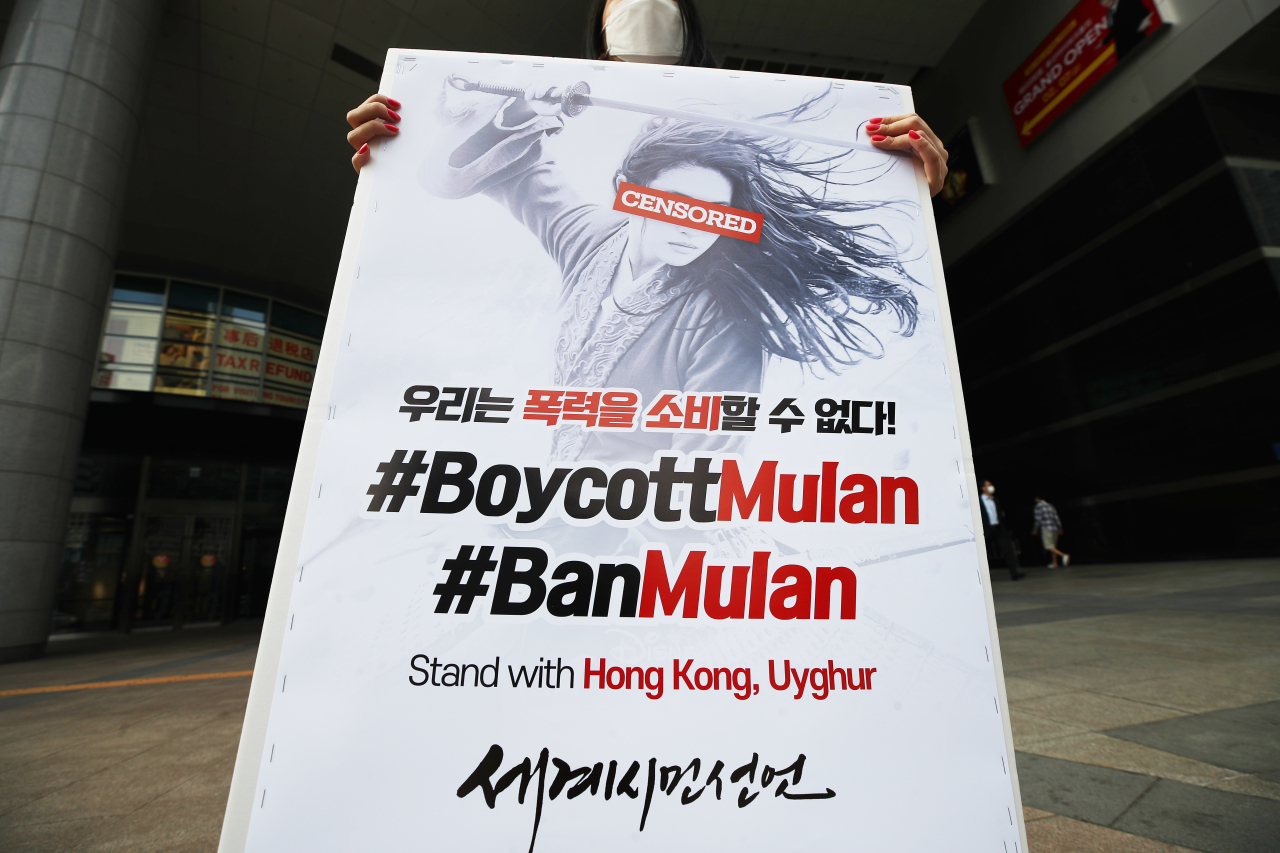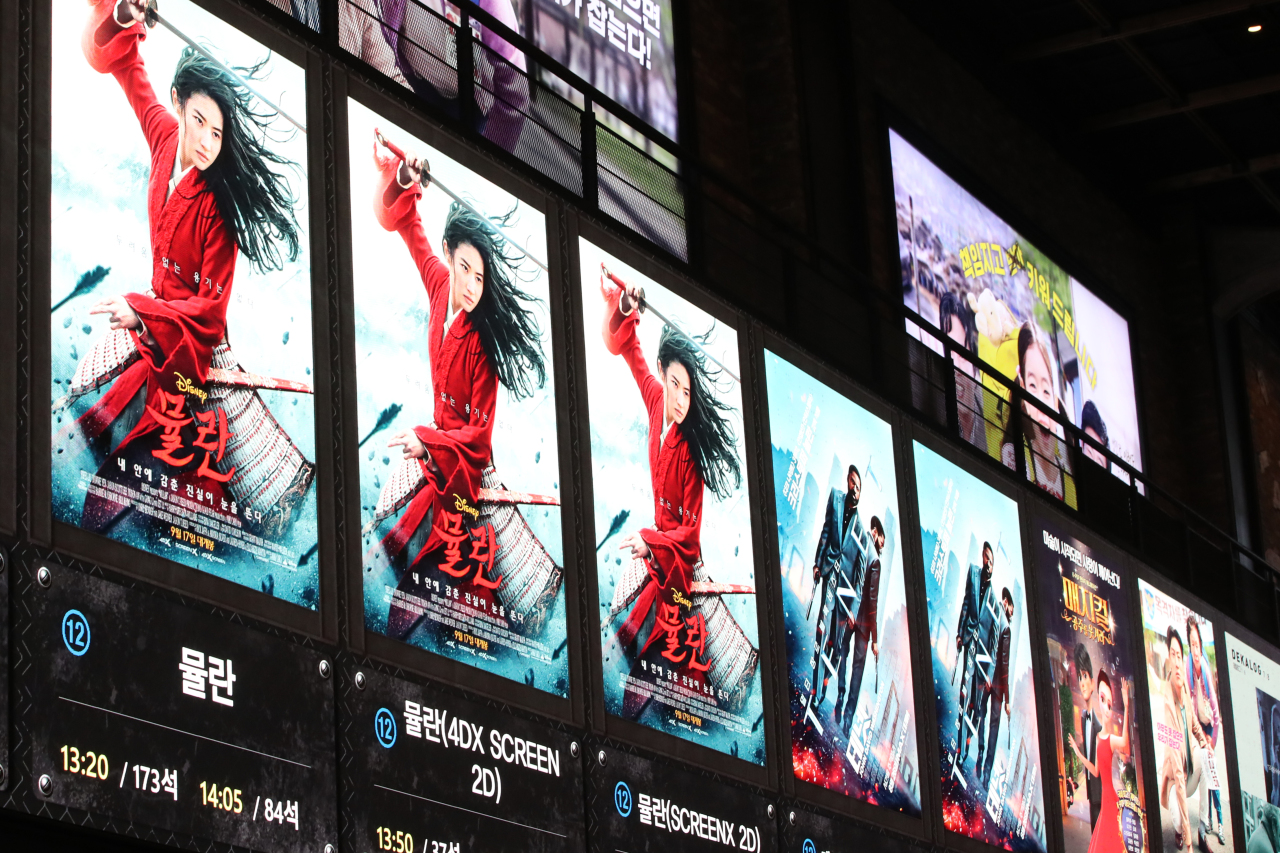 |
Lee Seoll-a, co-head of the Declaration of Global Citizen in Korea, holds a one-person rally boycotting against film “Mulan” in front of CGV Yongsan in central Seoul on Thursday. (Yonhap) |
The Walt Disney Co.’s live-action adaptation of animation “Mulan” hit local cinemas Thursday amid boycotts connected with the pro-democracy movement in Hong Kong and the treatment of Uighur Muslims in northwestern China.
The film topped the local box office chart ahead of its release, according to Korean Film Council data, with ticket sales apparently unaffected by the growing global movement against the film.
“The success of the movie itself is unrelated to our movement,” Lee Seoll-a, the co-head of the Declaration of Global Citizens in Korea, said during a one-person rally against the film’s release in front of the CGV Yongsan I’Park Mall branch in Seoul on Thursday. The Seoul-based student organization endorses the pro-democracy movement in Hong Kong.
“We believe ‘Mulan’ is content that turns a blind eye against state violence,” Lee said. “Our intention is to raise awareness about not consuming such unethical content and urging more people to pay attention to the issue.”
Disney is facing another wave of backlash since releasing the “Mulan” remake last week on its streaming platform Disney+. In the movie’s final credits, the film expresses special thanks to the Chinese government entities in Xinjiang where the film was shot. Xinjiang is an area in China where millions of Uighur Muslims have been detained and subjected to abuses, such as forced labor and brainwashing, in so-called “reeducation camps” operated by the Chinese government.
 |
Electronic board in CGV Yongsan, central Seoul, shows “Mulan” poster. (Yonhap) |
The boycott movement started last year after Chinese actor Liu Yifei, who plays the title character, went on social media and voiced support for Hong Kong’s police crackdown on protesters. The Hong Kong police are accused of using excessive force against pro-democracy demonstrators. In July the Declaration of Global Citizens in Korea, along with several other young political activists, held a rally and a press conference in front of the Walt Disney Co. Korea in Seoul, calling on Disney to cancel the film’s release.
Recalling Liu’s words on social media, Lee said, “Disney should have drawn a clear line that they hold a different opinion … but they took no action.”
Park Do-hyung, Lee’s colleague and co-head of the organization, held a one-person rally in front of Lotte Cinema in Hapjeong-dong, western Seoul, Thursday.
“Although it’s a tradition in the film industry to give special thanks to the filming venue, this just means the company chose the location out of their convenience, regardless of the human rights violations issues,” Park told The Korea Herald by phone.
“It’s all about money. The company has opted to become an accomplice of the Chinese government by getting permission to shoot in Xinjiang and staying silent about the violence committed there,” he said.
Park added that his movement was not only about Hong Kong.
“Influential government representatives and politicians from other countries are openly criticizing the film, but the South Korean government is staying silent. This boycott movement extends to making South Korea a just nation by showing solidarity with citizens of other countries,” Park said, adding that his organization, comprising around 60 youth activists in Korea, had also expressed support for other democratization movements around the world.
Meanwhile, hashtags of “boycott Mulan” and “ban Mulan” reemerged on social media in the days leading up to the film’s release. On Tuesday a large sheet of paper titled the “Mulan Boycott Lennon Wall” was reported to have been placed on the Megabox Sinchon building, with a message inviting people to join the movement and write messages of support. The action referenced the original Lennon Wall of the 1980s in Prague, where people left graffiti art and wrote down song lyrics from the Beatles to resist the communist government of the time.
By Choi Ji-won (
jwc@heraldcorp.com)








![[Weekender] Korea's traditional sauce culture gains global recognition](http://res.heraldm.com/phpwas/restmb_idxmake.php?idx=644&simg=/content/image/2024/11/21/20241121050153_0.jpg)
